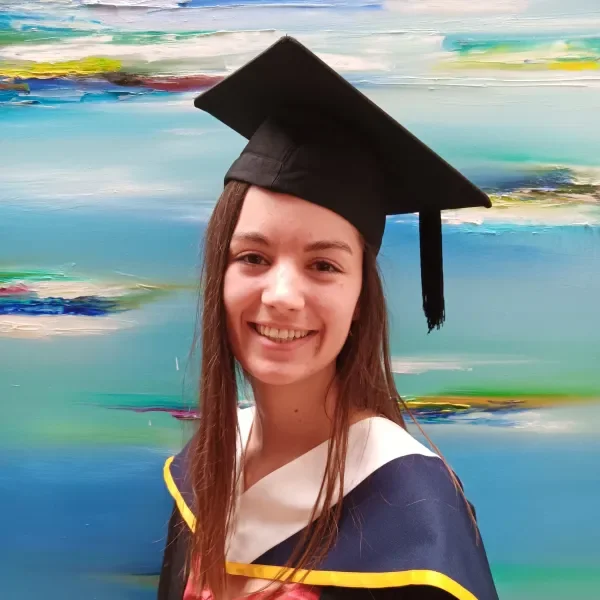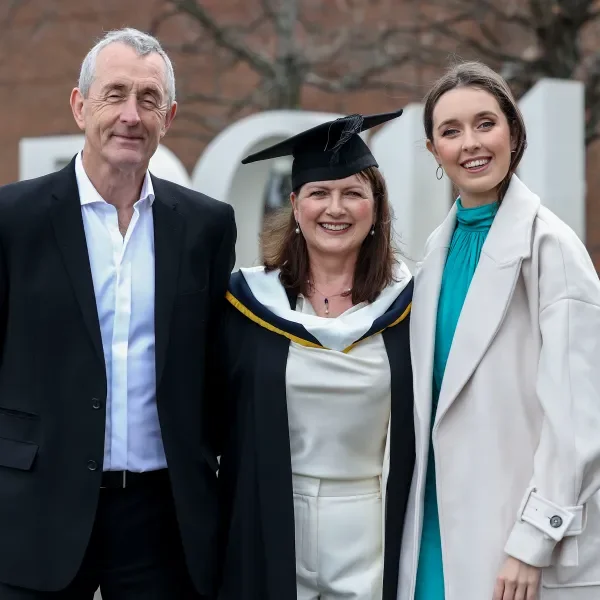Overview
This programme is suitable for people who want to work in various communication roles, whether it's in the public, private, or nonprofit sectors. It's also a good choice for those who are already working and want to advance their careers. For those looking to enter the job market, the MAP programme offers an opportunity for a work placement, while those who are already employed (typically part-time students) complete a reflection project.
If you're interested in topics like how the media covers politics, the influence of spin, fake news, disinformation, agenda-setting, public relations, political advertising and digital media, this programme is a great fit. All the courses combine both theoretical and practical aspects of political communication. Additionally, students will research and write a dissertation on a political communication topic of their choice.
Why DCU
DCU People

I chose the MA in Political Communication because of its focus on both theory and practice.
Read more about Frederieke Roording

Kevin Rafter is Full Professor of Political Communication at Dublin City University where he has been Head of the School of Communications and Associate Dean for Research.
Read more about Kevin Rafter

After four decades working in Leinster House and in high-powered communications roles for government departments, Roisin Deasy admits that opting to do a Master’s in Political Communicati
Read more about Roisin Deasy
Careers & Further Options
Careers
The MA in Political Communication programme appeals to individuals interested in pursuing careers in various communication sectors, including public, private and nonprofit. It's also beneficial for those who are already employed and seeking career advancement opportunities.
They can be found in roles such as political advisors, policy advisors, and media advisors across all major political parties in Ireland and even in the European Parliament. Additionally, they hold senior positions in numerous government departments and have successful careers in prominent public relations firms as well as in nonprofit and corporate sectors.
- Politics
- Public relations
- Government
- National and multinational companies
- Nonprofit organisations
"DCU graduates are highly sought after by employers. Our Graduates work in environments ranging from large multinationals to SMEs, family businesses and start-ups across every sector.
DCU Careers Service has a number of learning and development initiatives in place for our students, giving them the skills they need for a successful career path."
Entry Requirements
For admission to the MA in Political Communication programme, successful applicants will have:
• A degree at the level of an Irish or UK Honours undergraduate degree (H2.2 or above) or equivalent.
OR
• Applicants with appropriate combinations of professional qualifications and experience may also be considered. This includes discipline-specific knowledge and know-how; transferable skills; basic research competency; personal effectiveness.
• Recognition of Prior Learning (RPL) applicants are required to submit a cover letter along with their application under the Transcripts section of the portal, affirming their intent to apply for RPL. For more information on RPL see here.
• International candidates who are non-native speakers of English must satisfy the University of their competency in the English language.
Programme Structure
The MA in Political Communication delves into the dynamic and fast-evolving connections between the media, politics and the public. It explores how these interrelationships impact democracy and the distribution of power.
This programme tackles critical issues in today's political communication landscape, including how the media covers politics, fake news, disinformation, the influence of spin, agenda-setting, public relations, political advertising and digital media. It also explores the effects of various political communication strategies on politics, government decision-making, and non-governmental sectors.
Additionally, participants gain insights into the historical aspects of the media in Ireland and other places.
Delivery
The full-time programme is delivered over a twelve-month academic year from mid-September in three parts: two twelve-week teaching semesters (mid-September to mid-December; late-January to late-April) consisting of four/five modules per semester; completion of a research dissertation for submission at the end of August.
The programme is also offered on a part-time basis over two academic years.
Timetable
Core modules in the two teaching semesters are timetabled from Monday to Thursday, generally between 4pm and 9pm.
Please note this is not an evening programme – attendance outside these core hours is occasionally required but prior notice is provided.
Work Placement & New Modules
Please note as part of recent changes this programme now includes offers an opportunity for a work placement for all students (part-time students in employment may opt for a reflective research project). New core modules include ‘Political Communications 2: Campaigns & Strategies’ and ‘Information, Manipulation and Democracy’.
Semester One: Political Communication 1: Concepts & Issues; Media and Politics in Ireland; Social Media, Journalism & Democracy; Introduction to Research Methods.
Semester Two: Political Communication 2: Campaigns & Strategies; Information, Manipulation, and Democracy; Research Methodologies; Dissertation Preparation.
Students also pick from optional modules including: Public Relations: Issues and Principles; Data Communication; Media Audiences, Political Economy of the Environment and Gender & Sexuality in Digital Culture.
All taught modules combine political communication theory and practice. Students also prepare a dissertation as a piece of independent academic research in a political communication subject area of their choice.
Why do this programme?
- You'll collaborate with experienced academics who are actively involved in research in political communication, political science, and journalism studies.
- You'll have the opportunity to learn from guest lecturers with expertise from both national and international industry backgrounds.
- All your coursework will involve assignments that are focused on practical, real-world projects rather than traditional exams.
- You'll work on a supervised research project (dissertation) on a topic related to political communication that you're passionate about.
- Starting in 2024/25, you'll also get the chance to complete an industry work placement with a top communication organisation in Dublin.
- This program boasts a strong track record of graduates finding employment in prominent national and international workplaces.
DCU is a relatively new and forward-thinking university with a unique purpose: to make a positive impact on individuals and communities through education, research, and innovation.
Since it welcomed its first students in 1980, more than 50,000 students have earned their degrees from DCU and have gone on to hold important positions in the business world, contributing to enterprises and organisations on a global scale.
The School of Communications is a globally-oriented institution known for its exceptional teaching and research in the fields of media, communications and journalism. It has a history dating back to 1982 and holds a well-established reputation as the premier centre for communication studies in Ireland. The school has consistently earned a place in the top 150 out of nearly 4,500 universities worldwide in the field of communications, according to the QS World Rankings by Subject.
Those who have completed the MA in Political Communication program have achieved senior roles in various sectors, including politics and public relations. They've also made their mark in government, both at the national and multinational levels, as well as within nonprofit organisations. For a comprehensive list of the current positions held by graduates, you can refer to the 'Careers' section.
Fees and Funding
Fees
How To Apply
All Applicants must apply through DCU's Student Application Portal which is available here. Here's a quick step by step guide if you need help with your application:
• Provide Academic Transcripts for each and every year of study with English translation if applicable.
• If applicable, provide evidence of competence in the English language as per DCU entry requirements. Please see link http://www.dcu.ie/registry/english.shtml.
Please note if you are a non EU student and require a study visa, you are not eligible to apply for part-time programmes as study visas are only granted for full-time programmes.
Application Deadlines
Applications will be accepted on a rolling basis until the programme is full or until the following dates:
- Closing date for non EU applicants is 1st July 2025.
- Closing date for EU applicants is 30th August 2025.
Note applicants who require a study visa for the purposes of studying at DCU, are advised to apply as early as possible.
Please note if you are a non EU student and require a study visa, you are not eligible to apply for part-time programmes as study visas are only granted for full-time programmes.
All entry requirements should be met before the commencement of the programme.
Application Queries
For EU applicant queries, please visit https://www.dcu.ie/registry/eu-postgraduate-taught-admissions or email postgraduateadmissions@dcu.ie
For non EU applicant queries, please visit https://www.dcu.ie/registry/international-admissions-undergraduate-and-postgraduate or email internationaladmissions@dcu.ie
Commencement of Programme
The programme commences in September 2025.
Life On Campus
At DCU, our students can expect a unique campus experience. We are known for our excellent teaching and learning facilities, our active clubs and societies, and our great social and sporting facilities. All this makes DCU an exciting place to be.
DCU has three academic campuses; Glasnevin, St. Patrick’s and All Hallows (both in Drumcondra), all close to Dublin City centre.
They can be reached by public transport, Dublin Bus and Bus Éireann, with our Drumcondra campuses a ten minute walk from Drumcondra Train Station. Glasnevin is a 20 minute walk from St Patrick’s and All Hallows. They are also linked by Dublin Bus.
Each campus has a library (O’Reilly, Cregan and Woodlock Hall), study spaces, restaurants, and on-campus residencies. There are sports facilities on Glasnevin and St. Patrick’s, and there is a dedicated sports campus, St Claire’s, located near Glasnevin on the Ballymun Road.
DCU’s 19,000 students have access to exceptional teaching and learning facilities across our three academic campuses.
These include modern learning theatres, research centres, a new media and TV studio, radio/podcast studios, computer suites and advanced labs in the areas of Languages, Engineering, Physics, Chemistry and Biotechnology, as well as a Sports Performance centre and a training hospital ward. In 2021, we opened our first virtual reality ‘Leadership Lab’, which is located in our Business School.
We continue to improve and update our facilities. For example, construction of a new world-class STEM facility is underway on the Glasnevin campus. With capacity for an extra 3,000 STEM students, this facility will advance DCU’s international reputation for excellence in science and health, computing and engineering disciplines.
Studying in DCU isn’t just about course work. The university is rich in student life and activities.
There are more than 140 clubs and societies for students in DCU, with ‘Clubs & Socs’ days taking place on both the Glasnevin and Drumcondra campuses at the start of the academic year. They span everything from rugby to rock climbing, anime to jazz.
For many students, sport is an important part of the DCU experience. DCU’s Sports Complex boasts a 25 metre swimming pool, fitness centre gym, all-weather pitches and squash courts, as well as soccer, GAA and rugby pitches. DCU Dóchas Éireann, the university’s GAA club, is the largest third level Gaelic Games club in the country. Meanwhile, DCU Athletics has been Ireland’s highest achieving university club for many years. And DCU has dozens of other clubs to get involved in, from Archery to Weightlifting.
The Glasnevin campus is home to our purpose built, state-of-the-art student centre, The U, which serves the needs of a rapidly growing student body. Here, you will find the Student Leadership and Lifeskills Centre, performing arts and cultural spaces for students and the wider community, and the Entrepreneurship and Innovation Hub. Also located on our Glasnevin campus is The Helix, our renowned performing arts centre.
On our St Patrick’s campus, we have the Java Student Hub, a vibrant, warm and welcoming space where students can meet for coffee, play music, use the projector to watch events, or just relax. The walls of the Java Hub were designed based on the cultural history of St Patrick’s Campus, including the special references to the notable sporting history and history of the arts.
We have a number of academic, professional and social supports for students.
Student Advice & Learning Skills Centre - Offers a wide range of supports and services to students and advice
The Writing Centre - drop-in writing workshops for students through the academic year
Maths Learning Centre - provides maths support for students of all ability levels with maths modules
Student Learning - facilitate the transition from passive to active learning for students at DCU, by teaching study skills, nurturing critical thinking and building student confidence.
Careers work with students to help them on their professional journey into graduate employment.
Our student support team offers a comprehensive support programme, helping students make that all important transition into university life and focusing on building confidence and skills which are key to success at third level.

DCU Glasnevin Campus
FAQs
Is DCU all one campus?
DCU is a multi campus university - the Glasnevin, St Patrick's and All Hallows campuses. The St Patrick's campus is where the Education courses are taught and some of the subjects from the BA Joint Honours degree. There is a 20-25 minute walk between the campuses but there are buses and bikes available to go between them also.
Click here to see maps of all of our campuses
If I'm studying on the St Patrick's campus, can I use the library and sports centre on the Glasnevin campus?
Yes, all facilities such as sports and accommodation are open for all DCU students to avail of.
Are there libraries in DCU and if they have wifi and work stations?
We have a brand new state of the art four floor library on our St. Patrick's Campus which complements the existing library on the Glasnevin campus. There is free wifi, work stations as well as desktop computers.
Does DCU provide accommodation?
DCU does have on-campus accommodation for undergraduate and postgraduate students, and you can find out more and apply via the Accommodation Office webpage.








